In Massachusetts, the swift response to the outbreak of COVID-19 has left many residents confused about how the new rules put in place by Gov. Charlie Baker impacts them. Attorney General Maura Healey said the advisories around navigating public life has prompted many to call her office to ask for advice. On Wednesday, she joined Boston Public Radio for her regular “Ask the Attorney General” segment to answer listener calls and discuss some of the issues her office is working on during the pandemic.
Evictions Cannot Happen During The State Of Emergency
Massachusetts housing courts have previously said they will not hear any non-emergency eviction hearings throughout the state of emergency, which is currently in place until May 4. Baker has also urged landlords not to move forward with issuing eviction notices to tenants for non-payment of rent. On Wednesday, Healey said her office has been involved in at least one incident of a firm serving eviction notices to low income tenants. In the state legislature, bills to place a moratorium on evictions and foreclosures have passed in both chambers, and Baker has indicated he is waiting for a bill to be sent to his desk.
“This is really important. We don’t want people kicked out of their homes,” Healey said. “We don’t want people homeless.”
Debt Collectors Have Been Ordered To Stop Collecting Payments
In March, Healey’s office issued a regulation barring debt collectors from engaging in any activity that would require a consumer to either leave their home or have in-person contact with anyone. Under the 90 day regulation, collectors are also barred from filing new lawsuits against consumers, repossessing property, garnishing wages and making collection calls.
“This is not a time for people to be harassing and pursuing people for debts,” Healey said. “People are really struggling right now.”
Healey said that under the regulation, consumers can still pay debts and bills, and the action is not intended to dissuade individuals from making payments, but instead to deter the routine actions of debt collectors, which Healey said amounted to harassment.
The Attorney General’s Office Will Contact Employers Who Are Not Creating Safe Workspaces
Healey said that it is crucial for employers, who are still asking employees to go into work, to provide them with personal protective equipment. She pointed to guidance from the Centers for Disease Control and Occupational Safety and Health Administration, which also urges employers to provide equipment to their staffs. Since the onset of the pandemic, Healey has talked about the need for employers to create safe environments for workers, and said her office will contact employers who are not creating safe working conditions.
“This is about keeping people safe, both people who are on the front lines — whether they’re working at grocery stores or pharmacies — and also those coming into those stores,” Healey said. “We’re going to continue to be vigilant about this, and I encourage people to report to my office if you’re seeing things.”




